Fur, smiles and tears
A celebrity had entered the concourse at Vanderbilt Health One Hundred Oaks, causing quite a sensation. Eyes wide and mouths gaping open, onlookers young and old stopped in their tracks to gawk at the visitor, and many whipped out cell phones to snap a photo.
But then they started asking questions a starlet would never tolerate—“How much does she weigh?” and “How old is she?”
Paddy O’Hara, however, takes it in stride.
The 18-pound Flemish Giant Rabbit is used to the attention she gets on visits to Vanderbilt’s One Hundred Oaks campus, and her handler, Robin Mahoney, shows endless patience as she answers questions about Paddy and coaxes people over to stroke her unbelievably silky gray fur. She understands it’s not every day people encounter a rabbit, especially in a doctors’ office and especially one that can fill the seat of a wheelchair.
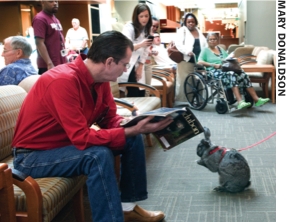
“She can be challenging to handle because of her size. She’s strong-willed and doesn’t like to be picked up,” Mahoney said. “Most people don’t think of rabbits as being smart, but she’s very clever. She recognizes where she is and what’s going on.”
Paddy O’Hara and Mahoney are part of Vanderbilt Volunteer Services’ Delta Society Pet Partner Visitation program, which uses pets to improve the health and well-being of patients, staff and visitors. The Delta Society is a national organization that trains and registers animals and their human handlers to interact safely and beneficially in a health care setting.
Vanderbilt has about 30 Delta-registered pet visitation teams. Dogs are most common, and Paddy is the first rabbit.
As Outreach Programs Manager at the Nashville Zoo, Mahoney worked with rabbits before and got Paddy in hopes she could be a therapy animal.
“To test her out, I just took her to PetSmart, put her in a shopping cart and let brave people pick her up and pet her. She was friendly and good, and I knew she would be perfect.”
Paddy can follow commands like “sit” and “stay” at home, but as a prey animal, her instincts tell her to be constantly vigilant in open areas like One Hundred Oaks, and she is too distracted to follow commands.
“She is more brave at home and you can see more of her personality. She acts more like a dog than I would have expected,” Mahoney said.
The rabbit wears a harness and leash so Mahoney can direct her to the people who want to pet her, which is basically everyone.
“Many people are nervous as they sit and wait for their treatment or wait for their loved ones to finish their appointment, but Paddy makes a big difference. Their faces just light up with awe. They’re thinking about a rabbit instead of their medical issues,” said Laurie Kush, activities coordinator for Volunteer Services at One Hundred Oaks.
Chloe really gets it
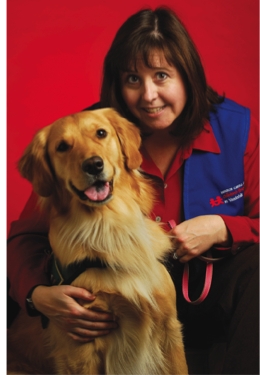
Becoming a Delta-registered visitation team is a rigorous process. The coursework takes about three months and is capped with an evaluation consisting of a skills test with about 20 different exercises, such as navigating crowds and role-playing negative situations, like tail or ear pulling. Scores are given for the handler, the animal and the team.
Pet visitation teams also go through the Vanderbilt Volunteer Services “onboarding” process, which includes application, interview and training.
“Not every animal can do it. They have to have the right temperament and interest level,” said Mindy Whitley, Vanderbilt’s Delta volunteer coordinator. “We’re lucky at Vanderbilt – the strictness of the process means Vanderbilt has the most dedicated Delta volunteers in the city.”
Whitley is quick to point out that pet visitation is not easy. Animals are put in demanding situations, with people fighting for their attention and sights and smells overwhelming their senses. Handlers must constantly evaluate the stress level of their animal and know how to create a good experience for the patient.
Whitley visits the Monroe Carell Jr. Children’s Hospital at Vanderbilt with her golden retriever Chloe.
“I’ll always remember a little girl who obviously felt terrible and laid across the bed on her stomach to hug the dog. Her mom said, ‘It’s OK, the dog understands, tell the dog,’ and the child burst into tears. Our visit lasted 5 or 10 minutes and all she did was hang on the dog and cry.”
Whitley said she has learned that animals have better instincts than their human handlers.
“Chloe has volunteered for five years now, and she really gets it. She can tell the energy a child has, and if she needs to be still, she’ll be still. She just got as close to that girl as she could and I didn’t say a word. The dogs really get what needs to be done, and part of being a handler is letting go and letting the dog work.”
Dancing with Mika
Perhaps the most stressful place for a pet visitation team is Vanderbilt Psychiatric Hospital (VPH), and Mika, a spunky Shetland sheepdog, and her handler Susan Lucas, are the first to visit there.
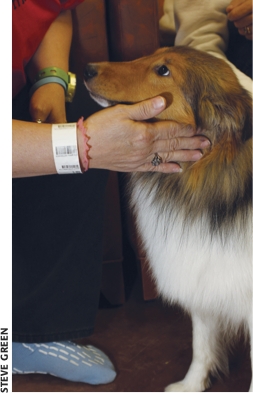
“The handler is the pivot point,” Lucas said. “I have to manage the dog, but also be sensitive to the people, sparking a conversation or pulling people in or redirecting people depending on the situation. We are truly a team and it is a dance.”
Keelen Woods, recreation therapist at VPH, said everyone is asking when Mika will visit again.
“Even the most sick or most in pain patient is excited to see Mika. She has the ability to calm down anyone. Even the ones who are disengaged are immediately focused on the dog,” she said.
Growing up, Lucas had border collies and participated in 4-H dog training. She wanted to try pet visitation therapy for many years, but waited until her children were in college. She has another Shetland sheepdog, Teddy, who visits the Cancer Infusion Clinic.
“I love the breed because they are so sensitive and sweet, but also very smart and extremely active,” she said. “The day we’re coming to volunteer I’ll take the blue vest out and say ‘Want to go to work?’ I try to get her hyped up for it. I’ll say ‘work’ and ‘Vanderbilt’ a lot, so she knows where we’re going. Both my dogs will be sleeping in the car, but when we pull on campus, they sit up and start watching. They know where we’re going.”
Mika has a sprightly walk and a fluffy coat that just begs to be stroked. In a group therapy class at VPH, she made rounds to each person, sitting calmly at their feet and even lying down on a few occasions. The patients are eager to talk about their own dogs at home and ask questions about Mika.
“Most people are out of their element in a hospital setting. Being a patient means having to present a certain vulnerability, and that can be unnerving and cause anxiety, even if you’re not really aware of it. But the patients are able to put all of that on the dog. Even though it looks like gentle petting, they’re taking all their loneliness, frustration or anxiety and passing it on to the dog,” Lucas said.
Three legs and boundless soul
And then there’s Eli. A Weimaraner with a missing leg and soulful eyes, he’s like a magnet for anyone who needs a little extra love.
“I always wanted to do pet therapy, and there was something about his past that I thought would help patients connect with him. I thought Eli could show kids in the hospital that he’s doing OK and they’ll be fine too,” said his handler Sallie McWilliams.
What a past he has. Eli was originally found wandering in Mississippi and taken to an animal shelter, which contacted Weimaraner Rescue of the South. Rescue volunteers nursed him through heartworm treatment and posted him for adoption, but no one inquired for more than a year. The volunteers were then hit by Hurricane Katrina, and Eli was transported to another foster home in Memphis. That’s when McWilliams said she first saw Eli, whom she called the most magnificent Weimaraner she had ever seen.
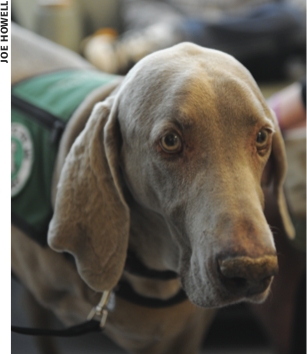
“The lady at the Weimeraner Rescue said he was definitely the best dog there but nobody wanted him because he only had three legs,” McWilliams said. “He’s just a big baby. When we got him, he was housetrained and has never had an accident, never chewed anything, never done anything wrong.”
McWilliams said her No. 1 priority on visits to the Infusion Clinic at the Children’s Hospital are to keep Eli safe. Things can happen quickly, especially when children have food or a toy that he wants.
“But we’re taught the ‘leave it’ command. I could put a piece of steak right in front of his nose, and he wouldn’t grab it until I released him.”
On their visits, McWilliams carries a bag with disinfectant, a bowl and water, an extra leash and a few surprises—a cowboy hat and bandana for Eli to wear and a photo album with silly pictures of him. He also hides Silly Bandz in his vest pocket, which encourages shy children to come up to him.
McWilliams acts like Eli’s interpreter, saying, “He’s glad he’s here to see you,” or, “He wants you to pet his ears,” as he makes his way around the clinic to see everyone. She has an amazing memory for the patients they have seen before, remembering their own pets at home and whether they watch American Idol.
Eli gets tired on just three legs and often just plops down on the floor, which the children find hilarious. They dance for him, read him stories and stroke his ears. And they smile.
Learn more about the Delta Society and its Middle Tennessee affiliate, Therapy ARC at www.therapyarc.org.
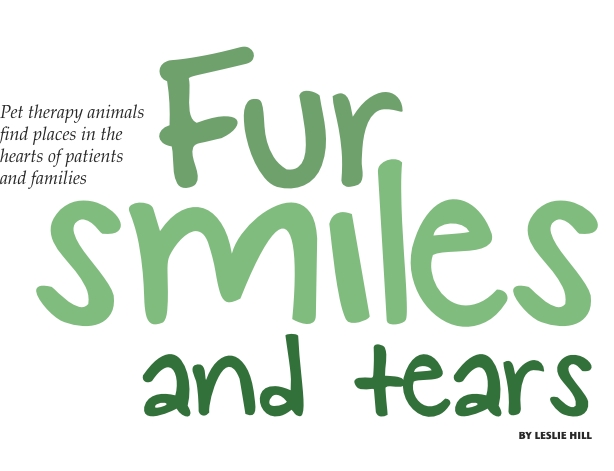
August 13th, 2011
Eli is a brave boy
August 30th, 2011
Thank you for this great article! And thank you to all the handlers and animals for volunteering and brightening up our lives.
August 31st, 2011
Nice job Leslie! Made me smile … and cry :-)u00a0
August 31st, 2011
Wonderful story!u00a0
October 4th, 2011
Great program.u00a0 Plan to get my dog Simba involved next year.u00a0 He has already been prescreened!
May 30th, 2013
The dogs in this post are so adorable!! I just love animals and would love to someday be a vet! My vet at http://www.beechmontpethospital.com/ has talked a lot to me about the joy and happiness that being a vet brings to life and would love to experience that one day!!